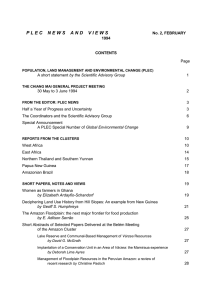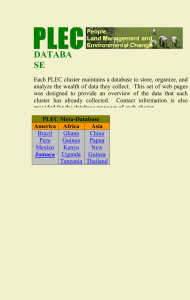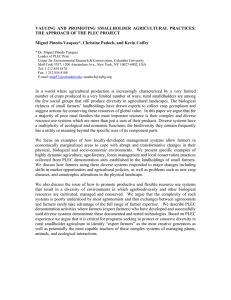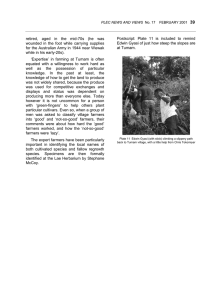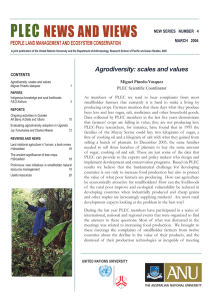PERU
advertisement
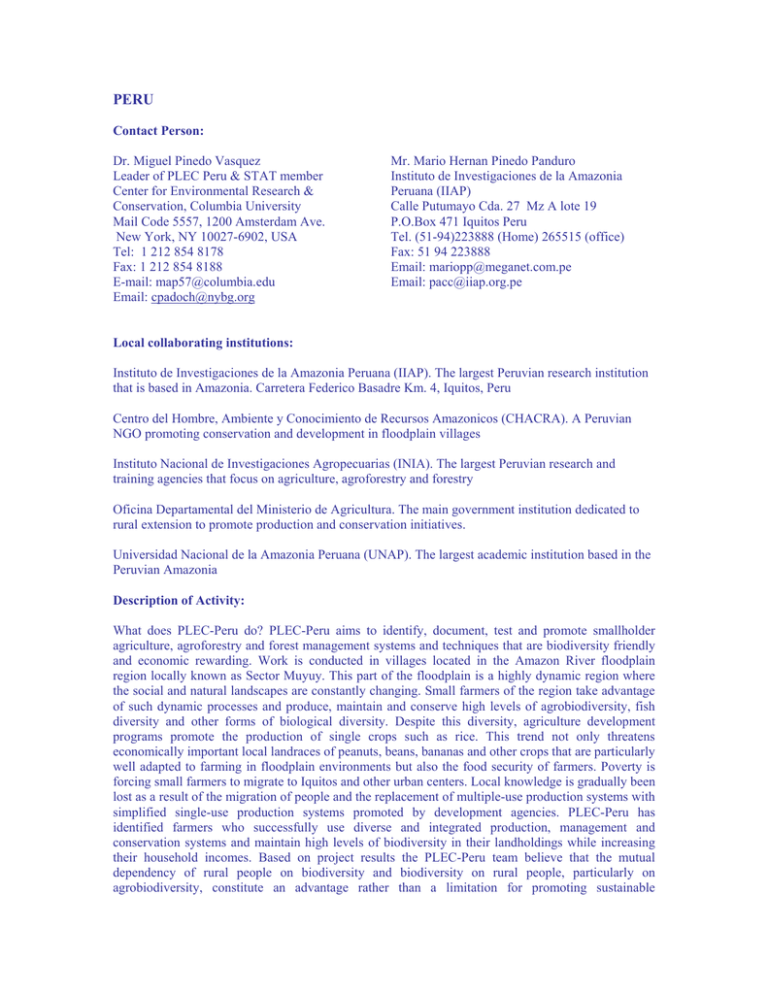
PERU Contact Person: Dr. Miguel Pinedo Vasquez Leader of PLEC Peru & STAT member Center for Environmental Research & Conservation, Columbia University Mail Code 5557, 1200 Amsterdam Ave. New York, NY 10027-6902, USA Tel: 1 212 854 8178 Fax: 1 212 854 8188 E-mail: map57@columbia.edu Email: cpadoch@nybg.org Mr. Mario Hernan Pinedo Panduro Instituto de Investigaciones de la Amazonia Peruana (IIAP) Calle Putumayo Cda. 27 Mz A lote 19 P.O.Box 471 Iquitos Peru Tel. (51-94)223888 (Home) 265515 (office) Fax: 51 94 223888 Email: mariopp@meganet.com.pe Email: pacc@iiap.org.pe Local collaborating institutions: Instituto de Investigaciones de la Amazonia Peruana (IIAP). The largest Peruvian research institution that is based in Amazonia. Carretera Federico Basadre Km. 4, Iquitos, Peru Centro del Hombre, Ambiente y Conocimiento de Recursos Amazonicos (CHACRA). A Peruvian NGO promoting conservation and development in floodplain villages Instituto Nacional de Investigaciones Agropecuarias (INIA). The largest Peruvian research and training agencies that focus on agriculture, agroforestry and forestry Oficina Departamental del Ministerio de Agricultura. The main government institution dedicated to rural extension to promote production and conservation initiatives. Universidad Nacional de la Amazonia Peruana (UNAP). The largest academic institution based in the Peruvian Amazonia Description of Activity: What does PLEC-Peru do? PLEC-Peru aims to identify, document, test and promote smallholder agriculture, agroforestry and forest management systems and techniques that are biodiversity friendly and economic rewarding. Work is conducted in villages located in the Amazon River floodplain region locally known as Sector Muyuy. This part of the floodplain is a highly dynamic region where the social and natural landscapes are constantly changing. Small farmers of the region take advantage of such dynamic processes and produce, maintain and conserve high levels of agrobiodiversity, fish diversity and other forms of biological diversity. Despite this diversity, agriculture development programs promote the production of single crops such as rice. This trend not only threatens economically important local landraces of peanuts, beans, bananas and other crops that are particularly well adapted to farming in floodplain environments but also the food security of farmers. Poverty is forcing small farmers to migrate to Iquitos and other urban centers. Local knowledge is gradually been lost as a result of the migration of people and the replacement of multiple-use production systems with simplified single-use production systems promoted by development agencies. PLEC-Peru has identified farmers who successfully use diverse and integrated production, management and conservation systems and maintain high levels of biodiversity in their landholdings while increasing their household incomes. Based on project results the PLEC-Peru team believe that the mutual dependency of rural people on biodiversity and biodiversity on rural people, particularly on agrobiodiversity, constitute an advantage rather than a limitation for promoting sustainable development. Diverse and integrated systems such as vuelitos (farming under trees), tablones (farming to diversify micro-environments) and others will be promoted by PLEC-Peru in the next phase of the project. These biodiversity friendly and economic rewarding systems help increase household incomes of small farmers in Muyuy and other regions of Amazonia. PLEC-Peru aims to promote these as well as other locally developed production and management systems as well as conservation practices through demonstration activities where experienced and "expert" farmers are the instructors. In the new phase of PLEC-Peru, partnerships with the "expert farmers" will be formed to train rural extension agents as well as people working in development and conservation programs. PLEC-Peru's future work will focus on three areas: 1) Capacity building, 2) Networking and 3) Monitoring. To achieve these goals PLEC-Peru will continue planning and implementing demonstration activities, training courses and research. Several articles reporting on the results of PLEC-Peru activities are available on the PLEC web-page (http://www.unu.edu/env/plec/). The following two articles are particularly recommended: 1) PLEC's demonstration and training activities in a dynamic political landscape. 2001. PN&V 18: 1519. 2) From forests to fields: incorporating smallholder knowledge in the camu-camu programme in Peru. PN&V 10: 17-26.
